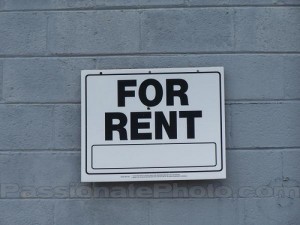Posted by Teresa on March 26, 2009 under Landlord Tips | 

If you’ve decided that property management is not for you, you’re not alone. There are thousands of successful property management companies because there is a real demand for their services. They have the expertise and experience to manage your property, plus they’re knowledgeable about all the laws affecting rental housing. They’ll handle all the bookkeeping, rent collection, and emergency issues, while dealing with tenants fairly and objectively.
There are certain disadvantages to using a professional service. First—they’re not free. If your margin between income and expenses is slim, it might not be cost-effective for you to hire a management company. Also, they might not care for your property as well as you, or be as aggressive in filling your vacancies as you would be.
Check out several property management firms before you decide on one. Have a checklist handy and ask at least these basic questions to narrow your choice:
• How will you prepare the rental unit for leasing?
• How will you advertise and show the unit?
• Do you prescreen tenants for credit and criminal records?
• What is the rent collection procedure? What about delinquent rent?
• What do you charge? Are there additional charges?
• Will I receive monthly reports? What do they include?
• How do you handle maintenance? What about emergencies?
• Do you mark up materials and supplies?
• How do you handle tenant complaints?
• How firmly will you enforce my rules and procedures?
• Can you give me an example of your attention to detail?
Always ask for references and follow through with talking to them. A complete client list is even better; specifically check with owners of properties in your size category. Visit the property management company’s office and meet the staff. Don’t sign the contract until you are sure the company has a sound track record. Know that some management companies charge lower fees and make up the difference in repairs, by marking up supplies and labor, or by performing unnecessary repairs.
Finally, make sure the company has adequate insurance. They should also be bonded to protect you, since they will be handling and collecting your money.
Finding the right property manager will make a big difference in your cash flow because they take care of all the issues that affect it. They fill the vacancies, find good, solid tenants, and perform all maintenance and accounting. Make sure you choose a property management company that is squarely on your side.
Posted by Teresa on March 20, 2009 under Landlord Tips, Tenant Screening & Background Checks | 

More Homeowners are Hanging This Sign
The economy is making landlords out of homeowners in ever-increasing numbers. For some, their home’s value has plummeted, and they are reluctant to sell at current prices, believing their home is worth more. Sellers are riding out the market, renting their homes until values increase again.
Others turn to renting because they cannot keep a house on the market indefinitely, while paying mortgage, taxes, and insurance. Renting becomes a way to cover out-of-pocket expenses.
Still others become landlords as a way to supplement income in retirement or while still employed. As times get tougher, investments trickier, and jobs uncertain, owning income-producing real estate makes sense to more and more people.
If you have decided to rent your home or invest in rental property, you now face another decision: to manage your property yourself, or hire a property management company. Ask yourself these questions to help you decide:
Are you a people person? Do you enjoy helping people solve problems—without much appreciation? Landlords cannot be shy or guarded—they should enjoy working with people from all backgrounds and personality types.
Are you patient? Do you convey a professional demeanor? Landlords must be tough, fair, and not easily ruffled. Some tenants will try to manipulate you; others will need more attention; still other tenants will require a firm hand. Landlords must be consistent with the rules, applying them equally to all tenants. Are you ready for this challenge?
Can you easily separate personal emotions from business decisions? If you rent your home, it becomes a business venture—some people cannot see it that way. If you manage tenants, their personal problems cannot become yours.
Are you well organized? Property management requires excellent record keeping skills, bookkeeping, and time-management. You must become familiar with housing laws and contracts, too.
Do you have maintenance and repair skills? Or can you manage someone who does?
Finally, are you willing to commit the time, effort, and stress involved in becoming your own property manager?
If you answered “yes” to all of these questions, then rental property management could be a good fit for your skills. If not, you might still consider it, knowing which areas need work, and where you need to be more flexible.
If your answers are all “no”s, then you might turn your attention to ventures other than managing property. Still, owning income property is not out of the question, because you don’t have to manage it yourself.
Start the decision-making process by being honest with yourself. Know your strengths and weaknesses. If you are truly up for the challenge, educate yourself to ensure you are not stepping over legal boundaries or into unfamiliar territory. The better prepared you are, the more successful you will be.
Managing rental property on your own does not have to be a completely solo venture. Seek out the resources that will help you do a better job, such as educational opportunities, maintenance service providers, and tenant screening services.
For more landlord resources, including everything you need to know about
tenant screening, turn to
E-Renter.com. You’ll know that you have the best possible tenants when you prescreen.
Posted by Teresa on March 18, 2009 under Eviction, Landlord Tenant Lawsuits | 

Courtesy of www.flickr.com/umjandoan
Eviction: the word itself sounds unpleasant, and it is—on both sides. Does any landlord begin the eviction process against a tenant unless it is absolutely necessary? It’s not likely that anyone actually enjoys the legalities, paperwork, court orders and stress that accompany this process.
The best way to prevent having to evict tenants is to do the work required up front to attract and retain the best tenants. A few examples are:
1. Keep your property in the best possible condition;
2. Keep communication open with your tenants;
3. Screen tenants prior to signing the rental agreement;
4. Put everything in writing.
Even when all seems to be going well, you could still experience a situation that cannot be tolerated; and eviction is the eventual result. Knowing what to do in this case can make it easier.
Eviction laws vary by state and even by locality; it is vital to follow them precisely. You may decide to consult an attorney or eviction service to assist you; if so, the web is a great resource to find these specialists.
There are basic rules to evict problem tenants, no matter where you live. First, a legal reason, such as violating the lease agreement, is required. Second, you must give the tenant notice. Each state has exacting procedures that define “proper notice.” Keep in mind that in some localities, you may not follow through on the eviction if you accept rent payments after giving notice. Third, you will have a legal proceeding before a judge. If the judge’s rule calls for eviction, there will be a notice of eviction from the court.
Now, the court may side with the tenant; if you decide to appeal the decision, be prepared for another lengthy and costly procedure. You will likely need legal representation for the appeals process. And, the tenants can appeal, as well—so a first-round victory doesn’t mean you’re completely off the hook.
Preparation is key: a solid rental agreement, along with evidence (such as photographs and communication logs) will be your best tools when facing the eviction process. It’s easier to stay organized from the beginning than to try to catch up when you’re facing a court date!
Next Post: Becoming a Landlord
Posted by Teresa on March 13, 2009 under Eviction, Landlord Tenant Lawsuits | 

The law protects tenants from evictions, rent increases, and other penalties a landlord might impose out of retaliation. Most often, this occurs after a tenant files a complaint or other action against the landlord. If you decide to evict a tenant, raise the rent, or terminate a lease, you must be prepared to prove it is not in retaliation for the tenant’s actions.
What is considered retaliatory action? If your tenant files a complaint through proper channels about your lack of maintenance or a code violation, you may not raise their rent, break their lease, or evict them. You may not threaten eviction or reduce services, either.
If you do decide to evict a tenant for legitimate reasons, such as severe property damage, non-payment or continual late payment of rent, or illegal activity, you must prove that your reason is legal. The law assumes a tenant who has filed a complaint and subsequently is evicted is being treated illegally. You cannot punish a tenant for exercising their rights under the law.
The reality is that once a tenant files a legal complaint, it becomes more difficult to later evict them, even with just cause. The best practice is to prevent such complaints with regular inspection schedules, proper maintenance, and good communication. In addition, prescreening tenants and checking references will be good clues as to their rental habits and history—before you enter a legal agreement to lease your property.
Posted by Teresa on March 11, 2009 under Landlord Tips, Tenant Screening & Background Checks | 

Stessed Out Over Problem Tenants?
Every landlord defines “problem tenants” differently, but all can agree they are just not easy to deal with. You might be considered lucky if your problem tenant is just late with the rent or is loud and disruptive at 3 a.m. While some bend the rules, others break your property, causing costly damages. And in extreme cases, tenants threaten harm to others or engage in illegal activity. Problem tenants cause much more than headaches for their landlords. What are your options in dealing with them?
Laws vary by state and even locality, so be sure to check with legal resources before proceeding to any action. Tenants have rights, too. You do not want to be sued for taking illegal action against a problem tenant. If you intend to end the tenancy for a rules violation, you must give the tenant written notice, with time for them to correct the problem. If a tenant is late on rent, you send a notice giving them a number of days to pay or they must vacate the premises. For recurring problems such as late payment, or major damages, you would send an unconditional notice to move, with no time to correct the issue.
When you have exhausted other options, there is often no choice other than to evict. Consistent late rent, severe property damage, illegal activity or non-payment of rent are good reasons to proceed to eviction.
It’s a good practice to communicate regularly with tenants, and to carefully document all communication. If you are claiming damages or lease violations, you must have proof if you end up in court, so make notes, send correspondence by certified mail when necessary, and take photos of all damages.
The best defense against problem tenantsis to prevent them from moving into your property in the first place. Prescreening tenants with reference, background and credit checks is not 100% foolproof, but it’s a good practice to establish. While there are no guarantees, and even the most cautious landlords have their share of bad tenants, prescreening will definitely help you avoid them.
Next Post: Illegal Retaliation
Posted by Teresa on March 7, 2009 under Landlord Tips, Tenant Credit Checks | 

Finding great tenants is a big job. So when you have them, you want them to stick around. If you’re renewing leases, it’s good sign that both parties are satisfied. Avoiding tenant turnover can yield significant cost savings—no major repairs or painting, cleanup, or advertising for new tenants. So, if you have a good track record with a current tenant, and you’re both happy, do what you can to renew the lease, and save yourself time, money, and trouble.
Communication is Important
There is no standard lease renewal process. Most leases are for a specified period of time; if there is no language regarding renewal, the lease expires on the date indicated, and your tenant is free to move out. In this situation, you’ll want to approach your tenant at least two months ahead to inquire about his or her plans. If you want your tenant to stay, make sure they know it! Of course, you have no obligation to renew a lease.
Renewal Language in a Lease
Even better: why not cover yourself and spell everything out in writing? Then, everyone knows what to expect. Your rental agreement or lease could include a “renew by” date, usually 30-60 days prior to expiration, by which your tenant must inform you if they are NOT renewing the lease. If they do not, it is assumed the lease will be extended. You can specify in the lease whether the renewal is for the same time period and under the same terms, or if it is month-to-month or some other length of time.
Be a Good Landlord
It doesn’t hurt to check in on your property regularly—and to check in with tenants when the lease is coming to its end. There may be a repair job needed, or a small upgrade you can provide to entice your tenants to stay. If you care about your tenants, make sure they know it!
Renew the Credit Check, Too
It’s a good idea to recheck a tenant’s credit when renewing the lease. Be sure you are in compliance with the Fair Credit Reporting Act if you do.
Posted by Teresa on March 5, 2009 under FCRA Issues, Tenant Credit Checks, Tenant Screening & Background Checks | 

Steering Clear of Problem Tenants
Managing rental property is no easy task. Why make it harder than it already is? After all, your properties are only as easy to manage as the tenants who live in them. Employing best practices consistently on each and every rental is the key to managing income property smoothly—and avoiding discrimination issues, too. One way to avoid trouble is to check potential tenants’ credit and criminal history.
Is it Legal to Check a Tenant’s Credit History?
Absolutely. Renting property brings monetary and legal risks to the property owner. You need to mitigate risk wherever you can, and checking credit history is a great way to do so. As part of the rental application, your prospective tenant can agree to a credit check with a signature. You’ll know for sure if the applicant is a good risk—or one to stay away from. Even a tenant with a great credit history can miss paying rent on time—but again, the idea is to lessen that risk by choosing the best possible tenant.
Remember that all information you learn from a credit report must be held in strictest confidence, and never shared with third parties. Your applicant may have a right to the report—check your state’s guidelines and the Fair Credit Reporting Act (FCRA) to be sure you are compliant. If you reject an applicant for credit reasons, you must advise them in writing. Consider having a reputable, professional tenant screening service handle your background screening to ensure you are within the guidelines of the FCRA.
What Will a Tenant Screening Credit Check Tell Me?
The credit check will reveal how promptly the applicant pays credit cards and loans, plus any outstanding judgments or bankruptcy filings. Look for a good record of responsible finances, and see if the applicant appears to be living beyond their means. Conservative spenders will be more likely to survive an emergency or job loss without major upheaval—like breaking your lease agreement.
The credit check will also reveal previous addresses—compare these with the application and investigate any inconsistencies. There could be a simple explanation—or the prospective tenant could be hiding something.
Is it Legal to Check a Tenant’s Credit History?
While you don’t have a legal duty or obligation to do so, you may certainly include criminal history in your tenant screening process. Keeping your property, other tenants, and yourself safe from potential damage is well worth it. These reports typically cover records at the county or national level; different reports are available in different states. Check with a professional tenant screening company for details.
The important thing to remember is to be consistent: screen all applicants in the same way, each time. Making an exception could be reinterpreted as discriminatory—and it could literally open your doors to potential problem tenants. A clear policy of running criminal background checks on all applicants is the best protection for you, your other tenants, and the community.
Next Post: Renewing Leases
Posted by Teresa on March 1, 2009 under General | 

Verify Before You Hand Over the Keys to a New Tenant
As Landlord, You’re in Control
As a landlord, you know only too well that you cannot control your tenants’ behavior, or that of their guests. You can’t control the occasional damaging wind storm or unexpected tree limb on the roof. But in the beginning, at least, of the landlord/tenant relationship, you are in complete control: as long as you comply with all applicable housing laws, you alone decide who is approved to rent your property. There are a number of factors you may use to decide whether to reject an applicant. Today we’ll look at employment and income.
Smart Landlords Verify
The rental application should contain the following information that you must confirm prior to approving the applicant: current and previous addresses, current and previous employment, income, Social Security and driver’s license numbers, plus personal and rental references. You can do this yourself or with a professional tenant screening service.
Verifying Employment and Income
You can simply call the employers listed on the rental application; however, many employers are hesitant or have policies against releasing information over the phone. You may need to request verification in writing. It’s not a bad idea to have this information in writing as a matter of procedure. You want to be sure your prospective tenant is currently employed, and has a reliable work history.
You can also ask the applicant to provide proof of employment and income, such as pay stubs. Don’t neglect to verify these with the source of the income to be certain they have not been falsified—or even fabricated completely. For sales or commission-based income, review at least six months worth of paystubs, or have the applicant supply you a copy of their previous year’s tax return. Ask for verification of any other sources of income to be used toward rent payments, such as child support or alimony. If any stated income cannot be verified, you do not have to include it when determining minimum income requirements.
When to Be Suspicious
Be wary of business phone numbers supplied by the applicant if they don’t sound like legitimate businesses when you call. Likewise, be suspicious if the applicant insists you speak only to a certain person—they could be a real HR clerk, or they could be a friend who will supply false information. Certainly, legitimate businesses don’t always answer the phone properly, but let your intuition be your guide—it will tell you whether you need to dig a little further.
You should also be on guard if your prospective tenant has plenty of cash for security deposits and first month’s rent, but no verifiable sources of income. If income is inconsistent with obvious spending patterns, be cautious. Cash without proof of income, or extreme spending on a low income could indicate illegal activity. You don’t want to have problems down the road with either a tenant who can’t pay rent regularly or with criminal activity on your property.
Prescreen Tenants for Complete Peace of Mind
The best way to be sure you’re renting to a qualified tenant is to prescreen rental applicants. It’s easier than you think to do this online —plus, you’ll reduce your risk and your stress level!
Next Post: Checking Tenant Credit and Criminal History
Posted by Teresa on February 25, 2009 under Fair Housing Act, Landlord Tips | 
The Fair Housing Act
You are required to comply with The Fair Housing Act (FHA) if you rent private housing, housing that receives Federal financial assistance or State/Local government housing. Essentially, if you rent any property whatsoever, you must follow the laws established under the FHA.The FHA prohibits discriminating on the basis of race, color, religion, sex, national origin, and family status. It also prohibits discrimination on the basis of disability. Under this section, owners of rental properties are required “to make reasonable exceptions in their policies and operations to afford people with disabilities equal housing opportunities.”
Who is considered disabled?
The Americans with Disabilities Act (ADA) defines an individual with a disability to be
“a person who has a physical or mental impairment that substantially limits one or more major life activities, a person who has a history or record of such an impairment, or a person who is perceived by others as having such an impairment.”
Pretty broad definition! And, the ADA does not specifically name all the impairments that are covered (it’s probably a very long list).
Making exceptions
So, if you’re a landlord, you are required to make “reasonable exceptions” to ensure disabled folks are not discriminated against. For example, even with a “no pets” policy, you may be required to make an exception to accommodate a service or companion animal. While a dog wearing a special red “service animal” vest or a wheelchair-pulling canine are pretty obvious, other companion animals are not so easy to spot.
You might think a deaf tenant would always be allowed to keep a dog to help out when the doorbell or phone rings, or the fire alarm is activated. Actually, a court decided that a dog owned by two deaf women had never been trained to assist them in any way, and therefore was nothing more than a “house pet”—and the landlord won its case.
[Bronk v. Ineichen, 54 F.3d 425 (7th Cir.1995)]
In another case, a dog with no training as a service animal was found to be therapeutic solely because of his “innate qualities.” The tenants were allowed to keep him. In still another case, a mentally disabled tenant was not allowed to keep two birds and two cats “for companionship.”
[Auburn Woods Homeowners Ass’n v. Fair Employment and Housing Commission, 121 Cal.App.4 1578, 18 Cal.Rptr.3d 669] [Janush v. Charities Housing Development Corp., 169 F.Supp.2d 1133 (N.D. Cal, 2000).]
What’s a Landlord to Do?
Because court rulings on this topic are as varied as the genetic makeup of a pound puppy, it seems there are no hard and fast rules to follow. Consider the following general guidelines, and remember: this is not legal advice! Every jurisdiction is subject to individual case law, so always seek the advice of your attorney for specific questions on your local laws, as well as FHA and ADA.
The law protects both physically and mentally disabled individuals. Don’t assume a person is not disabled based on appearance.
Not all trained service animals wear special vests or harnesses. Don’t assume a prospective tenant’s animal is not a service animal based on appearance.
Highly trained service animals, as well as companion animals who might not be specially trained, are not considered “pets.” Therefore, a “no-pet” policy would not apply.
Emotional support animals provide just that service—emotional support—to their owners.
It is reasonable to ask for proof of disability and need for a service/companion animal from a tenant’s physician or other health care provider in cases where the disability and/or need is not obvious.
It is reasonable to require all animals living on your property to be properly vaccinated and to follow any and all rules regarding leashing, waste disposal, etc.
While you cannot discriminate under the FHA, you are perfectly within your rights to screen all prospective tenants’ background and credit history.
Sources: Americans with Disabilities Act, Fair Housing Act, Fair Housing Institute
Next post: Verifying Tenant Income
Posted by Teresa on February 20, 2009 under General, Landlord Tips | 
If you’re a typical rental property owner, you’ve invested a great deal of money and sweat equity in your property: the initial purchase price, interest and taxes, ongoing repairs and improvements, plus dozens of incidental costs associated with owning any property. Protect your investment with a sound inspection policy and schedule.
The law requires that you properly maintain your property to meet all applicable health and safety codes (check your state and local laws and statutes for specifics). While it is certainly in your best interest to comply with the law and keep your property in top condition, it benefits your tenants, too. The good feelings that come with living in a safe, well-maintained home are valuable assets, and go a long way toward retaining high quality tenants.
Poorly maintained properties lead to higher tenant turnover, operating losses and even potential legal problems and expenses. Why take the risk?
Consider presenting new tenants with a Property Inspection Schedule, along with the lease, when they move in—or make it part of their Welcome Package. Either way, expectations are established right up front. Well-informed tenants could be more likely to keep small issues from becoming major hassles and repairs, too—saving you money in the long run.
What should the schedule include?
-
A checklist of items that will be inspected, for example: electrical, heating, and plumbing systems, smoke detectors, water heater, door and window locks;
-
A target date for each quarterly or semi-annual inspection, with a notice that you will contact tenants two weeks prior to arrange a convenient time;
-
Areas to detail any observed damages or needed repairs to systems, walls, ceilings, floors, roof, and landscaping;
-
Your contact numbers;
-
Date, time, and signature lines—to be signed by you and everyone listed on the lease.
Take photos of any damaged areas for your records. Let your tenants know when you will return to the property to make repairs—and what they can do to prevent the problem in the future.
Remember to keep a positive attitude throughout the inspection—the purpose is to keep everyone in compliance and safe. It is within your rights, however, to hold the tenant financially responsible for damages caused by negligence or misuse of your property.
Find landlord resources, including everything you need to know about tenant screening, from E-Renter.com.
Next post: Companion Animals and the Americans with Disabilities Act (ADA)









